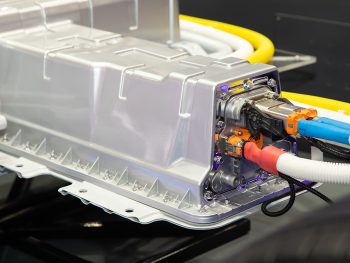UK sets out EV battery strategy to support net zero transition
The UK government has released its much-anticipated battery strategy that will underpin plans for a globally competitive battery supply chain by 2030.
Published by the Department for Business and Trade over the weekend, ahead of the Global Investment Summit, the strategy sets out plans for the UK to be “a world leader in sustainable battery design and manufacture, underpinned by a thriving battery innovation ecosystem”.
Welcomed by some but with concerns from others, the new strategy accompanies the Advanced Manufacturing Plan confirmed in the Autumn Statement, which pledges more than £2bn to support the manufacturing, supply chain and development of zero-emission vehicles. Last week also saw Nissan announce that it will build the all-new electric versions of the Qashqai and Juke along with the replacement for the Leaf in Sunderland.
Other measures in the new strategy include an additional £38m to enhance the UK Battery Industrialisation Centre development facilities, plus £12m for the Advanced Materials Battery Industrialisation Centre. The document also pledges to explore opportunities to promote the establishment of R&D centres in the UK from leading battery and EV manufacturers.
Batteries are essential in the transition towards net zero, not only powering electric vehicles but also grid-scale battery energy storage systems (BESS) that enable electricity to be used more flexibly and to decarbonise the energy system in a cost-effective way.
But a successful battery industry is also vital to seize global opportunities and support economic prosperity.
The new battery strategy sets out how the UK will build up its comparative advantage, scale up the emerging supply chain, and continue to secure internationally mobile investment under a ‘Design, Build, Sustain’ approach.
Nusrat Ghani MP, Minister of State for Industry and Economic Security at the Department for Business and Trade, said: “The UK has set one of the most ambitious targets to reduce carbon emissions. To successfully achieve this, we will create and maintain favourable conditions for ongoing industry investment amid strong overseas competition. The UK government is committed to continuing to invest in UK battery manufacturing.”
Mixed response to new strategy brings clear optimism but calls for more action
The transport, battery and EV sectors have reacted to the strategy with mixed feelings; generally indicating clear optimism but with concerns over the need for more substantive action.
Quentin Willson, founder of the FairCharge EV campaign group, said: “The Government announcing their battery strategy on a Sunday may seem odd but there are meetings this week with global investors, so running the flag up the mast now sends signals of the Government’s future industrial strategy. This is undoubtedly good news that they realise they need to be much clearer after the much-criticised U-turn on 2030 to 2035. Global investors and industry need to see consistency on battery and supply chain policy. But China, the US and Europe are powering ahead with battery investment, so the sums involved in the UK are rather small.
“The Conservatives know that Labour has a carefully crafted battery and EV plan so this is also very much of a defensive reaction. It is though good news for the EV, battery and renewables sector. This is exactly the sort of future battery strategy and EV vision that Fully Charged and FairCharge have been the asking for the last two years.”
EV trade group Recharge UK, part of the Association for Renewable Energy and Clean Technology, also welcomed the Government’s commitment to develop a strong and resilient battery manufacturing sector in the UK.
Matthew Adams, transport policy manager at REA, said: “The Government’s ‘Design, Build, Sustain’ methodology is comprehensive and goes some way to addressing many concerns raised around supply chain shortages and access to critical minerals and refinement as well as equipment shortages. There is also significant work underway to address concerns regarding energy demand and cost and planning, two areas of significant concern not just to the battery manufacturing sector but the wider EV sector too.
“We will work with government so that it can deliver a strong, robust and future proofed EV sector. It must protect and encourage growth of those starting up in the charging sector as well as continue to help established companies deliver on their objectives by enabling access to and deployment of renewable energy solutions and quick and timely installation of charge points by reforming the planning system and delivering on its commitments which we welcome in the ‘Plan for Drivers’.”
But Ben Nelmes, CEO of consultancy business New Automotive, said: “The Government’s battery strategy is a good first step, but it fails to match the scale of the money being spent by international competitors or the strength of the regulation being introduced in Europe or North America.
“Ministers will have to do better if they want to secure Britain’s place as a major battery manufacturing nation.”
And Julia Poliscanova, senior director at Transport & Environment, commented: “To have a successful green industry, the UK needs to also look further mid and upstream to onshore more sustainable processing of critical minerals such as copper and lithium. But above all, the UK and the rest of Europe must join forces and form a strategic battery alliance to compete in a fierce global clean tech race.”


